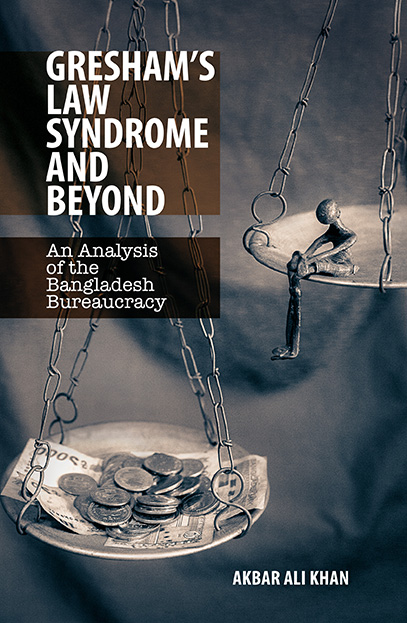- Shop
- Political Science
- Gresham's Law Syndrome and Beyond: An Analysis of the Bangladesh Bureaucracy
Gresham's Law Syndrome and Beyond: An Analysis of the Bangladesh Bureaucracy
https://uplbooks.com/shop/9789845062220-gresham-s-law-syndrome-and-beyond-an-analysis-of-the-bangladesh-bureaucracy-11888 https://uplbooks.com/web/image/product.template/11888/image_1920?unique=b656810
| Language: English |
Tags :
Book Info
Bangladesh has witnessed a continuous regress in governance since her birth in 1971. The flouting of most norms of personnel administration has created Gresham’s Law Syndrome where the bad drives out the good. All the apparatuses of modem bureaucracy in the Bangladesh administration are isomorphic mimicries which look like modern institutions on paper but prove to be ineffective. This monograph is an attempt to trace the roots and consequences of the administrative maladies. It also explores the solutions of mutually reinforcing problems. The book has several unique features. Firstly, it analyzes the administrative problems in Bangladesh in historical perspective. Secondly, the problems were analyzed in comparative perspective. Thirdly, attempts are made to evaluate the effects of measures taken after independence on the basis of quantitative evidence. This is a candid analysis of complexities and weaknesses of bureaucracy in Bangladesh, written by a former Cabinet Secretary who has spent the best part of his life in bureaucracy. Gresham ‘s Law Syndrome and Beyond offers a number of unconventional remedies for governance problems in Bangladesh. Hopefully, the recommendations of this book will stimulate debates among both practitioners and theoreticians of governance in Bangladesh.

Akbar Ali Khan
Akbar Ali Khan (born 1944) studied History in Dhaka University and Economics in Queens University, Canada (MA and PhD). Dr. Khan had been a career civil servant since 1967, actively participated in the Liberation War of Bangladesh in 1971 and was sentenced in absentia by military rules to fourteen years rigorous imprisonment. He served in highest positions in the Government for about ten years and retired as Cabinet Secretary. He also held the position of Alternate Executive Director in World Bank. After retirement, he established the Center for Governance Studies in BRAC University as its first Director. He was an Advisor in the Caretaker Government (2006-07) and subsequently resigned. Khan has several publications and a number of research articles on



